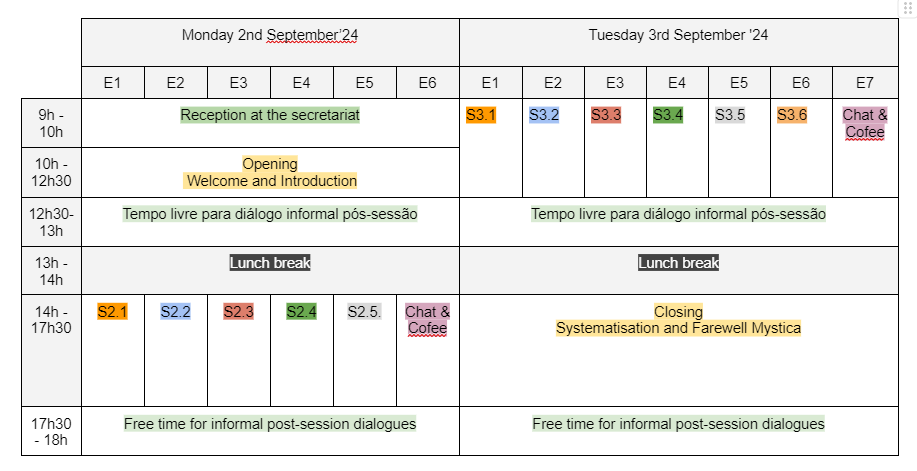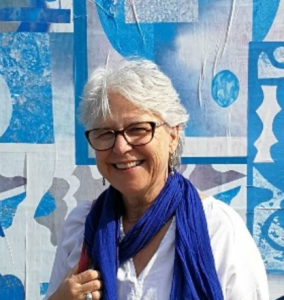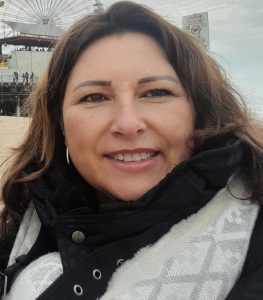Pre-Congress
course
2 and 3 september
A pre-congress course will be held on 2 and 3 September, on the theme of agroecological communication, which acts as the basis for facilitating the transition of agricultural practices towards healthy, fair and dignified food systems. The programme will be presented shortly, with several parallel sessions in which the topic will be broken down into theoretical, practical and experiential. Participants will have the pedagogical assumptions, cases illustrating methodological approaches and participatory tools useful for dialogue for the co-construction of agroecological knowledge. A responsibility for its dynamisation lies with the organising committee
1st day - 2 SEPT @10am
2nd day - 3 SEPT @ 09am
SCHEDULE

ADDITIONAL INFORMATION
- All sessions include 30 min. coffee break that the group must manage depending on the dynamics of their work.
- The 4 coffee breaks and 2 lunches have a cost separate from course registration, totaling €25, to be booked and paid here.
- There will be tables and microwaves available for those who bring their lunch and vending machines for snacks and coffees.
SESSIONS 1ST DAY (MONDAY)
MORNING 10AM-1PM
Opening – Monday, 10AM – 1PM
Welcome and introduction: Who we are, where we come from and why we are here | Pre-course training team (Please bring an object for the opening mystica that symbolizes what you want to share with the group)
Monday, 12.30PM – 1PM
Free time for informal post-session dialogues
LUNCH BREAK 1PM-2PM
Lunch free of animal products not included in the pre-course enrolment, subject to reservation and prior payment
AFTERNOON 2PM-6PM
S2.1 – Monday, 2PM – 5.30PM
Maria José de Dios Duarte, University of Valladolid, Spain
Farmers’ health and well-being: changing attitudes to change farming practices (part 1)
S2.2 – Monday, 2PM – 5.30PM
Celso Garrido, ADAPA – Associação para o Desenvolvimento Agropecuário e Proteção do Ambiente
Advisory services for export co-operatives and Participatory Guarantee Systems with family farming in São Tomé and Príncipe
S2.3 – Monday, 2PM – 5.30PM
Rebecca Avelino Mabui, União Nacional de Camponeses de Moçambique
Feminist School of Agroecology and Machamba School: the agroecological transition of women and young people in agriculture in Mozambique
S2.4 – Monday, 2PM – 5.30PM
Olga Domené-Painenao, ECOSUR, Mexico
Agroecological transition in family farming: the campesino – a – campesino methodology (part 1)
S2.5 – Monday, 2PM – 5.30PM
Santiago Peredo-Parada, Universidad de Santiago del Chile
Agroecology, Local Knowledge and Participatory Research: an Articulation of Knowledge
Chat & Coffe
A space for informal conversations where you can chat and respect the other person’s different ideas.
Monday, 5.30PM – 6PM
Free time for informal post-session dialogues
SESSIONS 2ND DAY (TUESDAY)
MORNING 9AM - 12.30PM
S3.1 – TUESDAY, 9AM- 12.30PM
Maria José de Dios Duarte, University of Valladolid, Spain
Farmers’ health and well-being: changing postures to change farming practices (part 2)
S3.2 – TUESDAY, 9AM- 12.30PM
Celso Garrido, ADAPA – Associação para o Desenvolvimento Agropecuário e Proteção do Ambiente
Advisory services for export co-operatives and Participatory Guarantee Systems with family farming in São Tomé and Príncipe (to be confirmed) |
S3.3 – TUESDAY, 9AM- 12.30PM
Rebecca Avelino Mabui, União Nacional de Camponeses de Moçambique
Feminist School of Agroecology and Machamba School: the agroecological transition of women and young people in agriculture in Mozambique (to be confirmed)
S3.4 – TUESDAY, 9AM- 12.30PM
Olga Domené-Painenao, ECOSUR, Mexico
Agroecological transition in family farming: the campesino – a – campesino methodology (part 2)
S3.5 – TUESDAY, 9AM- 12.30PM
Santiago Peredo-Parada, Universidad de Santiago del Chile
Agroecology, Local Knowledge and Participatory Research: an Articulation of Knowledges (reprise)
S3.6 – TUESDAY, 9AM- 12.30PM
Emma Siliprandi, Universidade Internacional da Andaluzia, e Márcia Tait, Universidade de Valladolid, Espanha
A Feminist perspective on agroecological communication: how to work with women’s and mixed groups in Brazil
Chat with Coffee
A space for informal conversations where you can chat and respect the other person’s different ideas.
TUESDAY, 12.30PM – 1PM
Free time for informal post-session dialogues
LUNCH BREAK 1PM - 2PM
Lunch free of animal products not included in the pre-course enrolment, subject to reservation and prior payment
AFTERNOON 2PM - 6PM
Closure – Tuesday, 2pm – 6pm
Pre-course training team
Systematisation and Mystica: feeling-thinking agroecology in communion
Session Presentation
Feminist School of Agroecology and Machamba School: the agroecological transition of women and young people in agriculture in Mozambique

Rebeca Avelino Mabui, Mozambique
Biographical note
Farmer woman and activist for women’s and land rights since 1996. Founding member of the Mozambican Forum of Rural Women since 2008. She currently serves as president of the Provincial Union of Peasants in Maputo province and secretary of the board of directors of the National Union of Peasants of Mozambique (UNAC). In the past, the greatest challenge for rural women was low levels of education, but today, with agribusiness, the challenges have increased. The fact is that rural women are not prepared to live with agribusiness. When they arrive, they occupy large tracts of land. As such, rural women need to be prepared to understand the legislation and master the Land Law in order to know how to deal with new investments” (Rebeca Mabui, 2019).
Description
Rebeca Mabui will share her experience in organizing two spaces that are essential for training women and young people in agroecology in practice and theory in Mozambique. Starting by telling her own story and what led a peasant woman to become an activist for the rights of women and young peasant women at an international level, Rebeca will present the process and structure of organized agroecological training in Mozambique, with the support of Via Campesina. The international feminist schools and the territorially-based farm schools will be described in terms of their functioning and methodologies, success factors and difficulties. In small groups and with the support of guiding questions, participants will be able to analyze the case and then discuss it based on their own experiences and knowledge, trying out proposed ways to solve the challenges presented. After the large group discussion of the results of the work, Rebeca will propose a joint reflection to obtain a synthesis of the most important ideas identified by herself and the large group.
Advisory services for export co-operatives and Participatory Guarantee Systems with family farming in São Tomé and Príncipe

Celso Garrido, São Tomé e Príncipe
Biographical note
Agricultural Engineer from the University of ISCAH (Instituto Superior Ciências Agropecuárias Havana) in Cuba and Agricultural Engineer from the University of ISCAH (Instituto Superior Ciencias Agropecuárias Havana) in Cuba. He is now Director of the Agro-Technological Improvement Center (CATAP) of São Tomé and Príncipe (STP) and part of the team responsible for the Professional Schools of STP, Coordinator of the National Council for Food and Nutritional Security of São Tomé and Príncipe (COSAN-STP) and focal point for São Tomé and Príncipe at ESAN-CPLP, working group on family farming (GTAF). Agricultural Engineer from the University of ISCAH (Instituto Superior Agricultural Sciences Havana) in Cuba
Description
This session will look at the experience conducted by São Toméan rural extension technical agents who supported the population in setting up agroforestry systems for export crops in the context of the land redistribution process conducted by the São Tomé government following independence. Two processes will be analysed: the formation of family cooperatives for the export of cocoa, coffee and pepper and the implementation of a participatory guarantee system with producers/horticulturists for the certified organic market. After contextualising the situation and its historical development for each case, the description will include identification of the factors that led to success, the constraints that hindered the process and the current challenges. Offering a space to analyse the cases presented, Celso Garrido will provide a space for guided dialogue with the participants, organised in small groups, to deepen their understanding of the cases. This will be followed by a space where reflections on the analyses and the description of other reports of related experiences can provide mutual benefit from the meeting of experiences, in the search for clues to resolving unique and common challenges. The meeting will end with a time to systematise the lessons learned during the session, highlighting the importance of creating spaces for dialogue and reflection together between those working on the same issues, as a community of practice can offer.
A Feminist perspective on agroecological communication: how to work with women's and mixed groups in Brazil

Emma Siliprandi & Márcia Tait, Brazil
Biographical note - Emma Siliprandi
Emma Siliprandi is a Brazilian social researcher who has been involved in the construction of a feminist agroecology for years. She is an agricultural engineer by training, with a master’s degree in sociology and a doctorate in sustainable development. She has advised NGOs and women’s movements, has been part of government teams at various levels and has worked at universities as a professor and researcher in different countries. She was an Agricultural Officer at the FAO between 2013 and 2024, being responsible for the “Scaling up Agroecology Initiative”. Now retired, she lives in Spain and collaborates on different research projects. She is the coordinator of the Gender Module of the Master’s Degree in Agroecology at the International University of Andalusia. She has published articles and book chapters on issues related to women and agroecology, including the books “Agroecología en Femenino” (which she co-edited with Gloria Zuluaga and Georgina Catacora-Vargas; SOCLA/CLACSO, 2018) and “Género, agroecología y soberanía alimentaria” (which she co-edited with Gloria Zuluaga; Icaria, 2014). In addition, she has also published in Portuguese the book “Mulheres e Agroecologia, transforma o campo, as florestaes e as pessoas” (UFRJ, 2015).
Biographical note - Márcia Tait
Márcia Tait is currently an associate professor at the University of Valladolid. She is a journalist specializing in Scientific Journalism, with a Master’s and PhD in Science and Technology Policy (Unicamp). She also holds a post-doctorate from Unicamp (2016/2021), with a Capes scholarship and works as a professor at the Department of Science and Technology Policy and a Master’s in Science and Cultural Dissemination. She participated in the extension and postgraduate course “Environment, Agrarian Issues and Multimedia” and in the project to create and develop the “Sementeia Platform (multimedia, education and resistance on a virtual platform)” and the “Unicamp Agroecology Network (RAU)”. She has international experience in several countries, as a workshop facilitator and researcher (ALLSA-Perú; CLACSO; World-Transforming Technologies -WTT, UN-Women and Bori Agency)”. In 2023, she collaborated with the Master’s Degree in Agroecology, Food Sovereignty and Cooperation for Rural Development, at the University of La Laguna and with specialized Writing courses with Verakis Food Academy. Author of the books “Technoscience and Scientists: Scientism and controversies in Brazilian biosafety policy” (Annablume, 2011); “They say no! Peasant women and resistance to transgenic crops” (Librum, 2015), winner of the 2016 Marcel Roche Prize from the Latin American Association for Social Studies in Science and Technology (ESOCITE); and “Agriculture in the City: The Cultivation of Food and the Commons by Women”, co-authored with Laura Carvalho.
Description
Using a theoretical-participatory approach based on dialogue and with space for reports of experiences between participants, Emma Siliprandi and Márcia Tait will begin this session with a presentation of the issues and educational assumptions underlying the preparation and management of communication and group dynamics in women’s and mixed groups. The aim is to find out how to ensure that female-bodied people can use their power of speech with confidence, to dignify their experiences in the face of frequent situations of invisibility, diminishment and violence to which they may be subjected in their families and communities. Emma and Marcia will then create a safe space for sharing in a small group for reports and analyses of individual experiences based on prepared proposals. In a third moment, they will encourage a large group dialogue based on the contributions of the small groups, ending with the systematization of the knowledge gathered over time together. At the end of this session, it will be possible to learn more about what can be essential to give visibility to the person and knowledge brought by peasant women, agricultural workers or farmers. From an intersectional perspective, the gender dimension will be addressed together with the dimensions of class, ethnicity, generation and sexual orientation, making clear the complex and introductory nature that a 3-hour session can offer.
Farmers' health and well-being: changing postures to change farming practices

Maria José de Dios Duarte & Susana Sebastián, Universidad de Valladolid, Spain
Biographical note - M J de Dios Duarte
M. José de Dios has been leading a line of research focused on Humanisation for over 20 years. His research focuses on caring for people from a holistic perspective, taking into account the physical, psychological, social and relational aspects of the person, without establishing boundaries between one area and another, and considering the person as a whole. Several of her research projects are related to social, psychological and emotional contributions to the management of illness so that the person can better adjust to it. She has a degree in Nursing, a degree in Business Administration and Management and a PhD from the Complutense University of Madrid in the Social Psychology PhD Programme. She worked as a nurse for 18 years in Psychiatry, Palliative Care and the Madrid Community Youth Centre. She has been a university lecturer for over 22 years where, among other things, she has taught and coordinated subjects related to the area of Management in the university courses of Bachelor of Nursing, Bachelor of Business Administration and Management, Bachelor of Nursing and Master of Urgency and Emergency. She is currently a lecturer/researcher at the University of Valladolid.
Biographical note - Susana Sebastián
Susana Sebastián is a Nursing Assistant who has been working with palliative care patients with cancer and other illnesses for 15 years, accompanying them through the end-of-life process and helping them to achieve a dignified death.
Description
Maria de Dios Duarte will begin the session by leading a set of postural hygiene practices followed by a dialogue with the participants about their experience of the exercises. She will then lead a large-group activity to deduce the principles from the practice, introducing the theme of well-being and the importance of self-care for the prevention of illness and mortality, with a gender perspective. Afterwards, she will propose a small group task to transpose the general principles to the specific reality of agricultural work: what characteristics should the most common manual or mechanised tools have? What design of production system is best suited to a posture that safeguards the health of the body? How can exercise before and after work be integrated into the daily routine of agricultural labour? What other difficulties can hinder the promotion of well-being in agricultural activity? This session will provide the opportunity to build knowledge from the body about the most suitable postures for farm work, exercises to prepare for them and stretching after work in the field. It will also include tips on how to replicate them in the professional realities of the participants.
Agroecological transition in family farming: the campesino - a - campesino methodology

Olga Domené-Painenao, México
Biographical note
Academic and agroecologist with experience in the design and implementation of university educational programs in rural and urban contexts, as well as in the development and implementation of agroecological projects from a participatory and popular education perspective. Founder of the Graduate Training Program in Agroecology at the Bolivarian University of Venezuela and of the Instituto Latinoamericano de Agroecologia Paulo Freire (IALA) of La Via Campesina in Venezuela. Her research topics include Popular Education, Participatory Methodologies Approaches, Rural Depopulation and the role of the Subject in the processes of territorialization of agroecology. Member of the research team on Massification of Agroecology at the Colegio de la Frontera Sur (Ecosur) in Mexico, as well as part of the National Specialization in Community Well-being mentioning Agroecological and Food Sovereignties (ENBC-ASA) in Yucatán and Quintana Roo.
Description
In this course, we will learn about some epistemic, political and educational principles and foundations of popular methodologies that favor the expansion of agroecological processes in the world. Understanding this expansion or territorialization as the way in which people in a community or organization materially and symbolically appropriate the place, appropriating and making use of agroecological practices and knowledge. These are spaces where lived experience is valued and where the importance of dialogue between knowledge and contexts is highlighted. And they determine the design of educational practices based on learning by doing that make other knowledge systems visible. One of the most important is the Campesina a Campesino Method.
Agroecology, Local Knowledge and Participatory Research: an Articulation of Knowledge

Santiago Peredo-Parada, Chile
Biographical note
Dedicated to applied research with and for agricultural and rural communities. Through a transdisciplinary approach and articulating methodologies, we co-design and implement agroecological transition strategies with different actors in a territory based on the needs and demands of the subjects involved. All this experience is applied to teaching, through active learning methodologies among students from different areas of knowledge and levels of training, as well as through adult continuing education programs and the exchange of knowledge among farmers from different parts of Chile.
Description
Agroecology, as a scientific approach, constitutes an interaction between the knowledge of peasant groups and that of technologists, which, through participatory dynamics, allows, among other things, an alternative construction for the ecological management of biodiversity at different territorial levels. The objective of this session is to present local knowledge as an epistemic source for agroecology. To this end, in the first part, the main elements of peasant knowledge are addressed as a fundamental component of their ecosystems with the strategy of harmonious management of nature. Secondly, in a schematic way, the main characteristics of participatory research and its application/adaptation to peasant work in biodiversity management are presented. Finally, the experiences with rural communities in Central and Southern Chile are discussed.